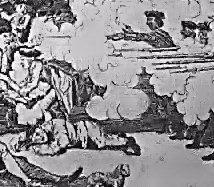In February 1770, eleven year old Christopher Sneider was shot and killed by a British merchant during a riot. His funeral drew thousands of people and was probably still on the minds of all the residents of Boston on March 5th.
On Monday, March 5, 1770, the conflicts between the colonists and the Boston Garrison soldiers grew. A merchant and one of the soldiers were arguing and some of the townspeople gathered. They began to throw snowballs and rocks at the soldiers. Soon Captain Thomas Preston and a small group of soldiers arrived. Private Hugh Montgomery of the British troops was hit by a club thrown from the crowd. When he got up, he fired into the crowd. Soon other British soldiers started firing wildly with their guns.
Three colonists died instantly and two more died later from the injuries they received during the shooting. The people who were killed were: Crispus Attucks, a freed black slave; Samuel Gray, a worker at rope walk; James Caldwell, a mate on a American ship; Samuel Maverick, a seventeen year old male; and Patrick Carr, a feather maker. Six other people were injured.
Crispus Attucks was either black or black and Native American. He had escaped from slavery. He was probably the first man killed in the Boston Massacre. In the Boston Commons, there is a statute of him.
After the incident, Sam Adams insisted the British troops leave Boston. The Massachusetts governor moved the soldiers to Castle William on one of the nearby islands.
The captain of the soldiers, Thomas Preston, and six of his men were arrested and charged with murder. John Adams, who later became president, and Josiah Quincy were their attorneys. Two soldiers were found guilty of manslaughter. Their punishment was to be branded on their thumbs and then they were released. Captain Preston and the others were not found guilty.
The Boston Massacre increased the hatred between the Americans and the British.





